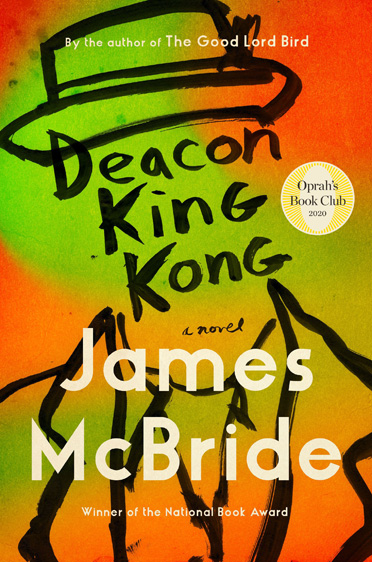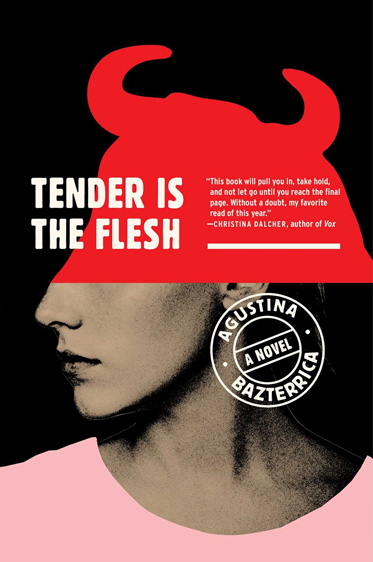-
March 9, 2021
Opening Round
-
James McBride
1Deacon King Kong
v.
4Tender Is the FleshAgustina Bazterrica
-
Judged by
Tobias Carroll
I spent a lot of 2020 thinking about transgressive and contradictory fiction. It seemed fitting for the year, for one thing; it also made things click inside my brain in ways that other books didn’t always do, in a year where my normal reading habits quietly imploded. (B.R. Yeager’s Negative Space, a novel that suggests Dennis Cooper trying his hand at cosmic horror, might be the pinnacle of “this just feels right in 2020” for me.) And here before me are two books, each abounding with contradictions and transgressions. Where to begin?
Tender Is the Flesh is a novel about Marcos, a man dealing with a crumbling private life. Marcos and his wife are separated after the death of their son; Marcos and his sister are estranged due to their father’s slide into dementia. He’s also feeling increasingly ambivalent about his job, which happens to be working in a facility that slaughters humans for their meat.
In the near-future society in which Tender Is the Flesh is set, a virus called GCB has made the consumption of animals fatal to humans. Gradually, society came around to the idea of normalized cannibalism. The meat industry “began to breed people as animals to supply the massive demand for meat.” (BoJack Horseman viewers who saw the episode “Chickens” will experience a strange sense of déjà vu here, I suspect.) Dehumanization becomes one of the book’s running themes—we don’t learn Marcos’s first name until we’re well into the novel, which seems significant.
Marcos’s life takes on an additional complication when he’s given a woman bred for consumption. He’s initially disgusted by her, but finds himself slowly becoming attracted to her, and if that situation sounds incredibly disturbing to you, rest assured that things get much, much worse. Tender Is the Flesh is not a tremendously subtle book, but one of the few understated things about it is how it suggests that the normalization of cannibalism has opened the door to other horrific events becoming commonplace. The novel includes several scenes of rape, murder, and animal torture; there are individual moments that left me shuddering.
* * *
Deacon King Kong begins with an act of violence as well. Cuffy “Sportcoat” Lambkin, an aging church deacon, approaches Deems Clemens, a drug dealer, and shoots him. The year is 1969; the place is South Brooklyn’s Causeway Housing Projects. The gunshot causes Clemens to choke, at which point Sportcoat attempts to save his life; later in the novel, we’ll learn that he remembers neither action. That’s due to the “King Kong” part of the title—a variety of moonshine made by one of Sportcoat’s friends that Sportcoat spends much of the novel drunk on.
There’s a full range of Note Books and related stationery products at fieldnotesbrand.com. Field Notes is proud to once again be a sponsor of the Tournament of Books.
From the first sentence of the novel, we’re prompted to think that Sportcoat’s actions will lead to his demise. And gradually, a number of threads coalesce: Clemens’s higher-ups in the drug trade sending hired guns after Sportcoat; a gangster nicknamed “The Elephant” trying to leave criminal activity behind; and Potts, a police officer investigating the shooting who finds himself falling for Sister Gee, a member of Sportcoat’s church.
Except that explaining things that way doesn’t really capture the genuinely sprawling approach on display here, both in the prose and in the plotting. There’s a passage early on about mysterious cheese that arrives monthly at the Cause Houses that turns rapturous; several chapters later, we’re treated to the origin story of some particularly vicious ants. (Did I mention that the first chapter is called “Jesus’s Cheese?”) Part of the pleasure of reading this novel is for its seeming digressions; part comes from the moment where a seeming digression turns out to pay off wonderfully hundreds of pages later.
* * *
These two novels have little in common, and they have plenty in common. They’re both about an aging man who finds himself at odds with the prevailing society around him. They both involve dramatic shifts to the expected order: In Tender Is the Flesh, humans embracing cannibalism upends every other nominally human interaction; in Deacon King Kong, a nominal man of God tries his hand at attempted murder, then works to save the man he shot. Do you want contradictions in your narrative? Both of these books have it in abundance.
Both of these novels are about their setting and their community as much as they are about their central character. It’s here, unfortunately, that my biggest issue with Tender Is the Flesh comes to the foreground.
Tender Is the Flesh spends a lot of time filling in the backstory that explains how human society got to widespread cannibalism. It’s so detailed, in fact, that Marcos entertains the possibility that the virus that led to global cannibalism was a hoax, designed as part of a global effort to reduce overpopulation. Here’s the problem: I didn’t buy it. (That would be the societal shift in favor of cannibalism; as for the idea that it might be a hoax or a conspiracy, I was never sure how seriously I was meant to take this, or even the extent to which Marcos himself had bought into it.) The idea that the bulk of humanity would opt to eat other humans in lieu of adopting a vegetarian diet—or that corporations wouldn’t put the same efforts that they did into factory farming people into lab-grown meat—seems fundamentally off somehow. Had Tender Is the Flesh been told via a more surreal, dreamlike approach, without every aspect of society explained—Rupert Thomson’s Divided Kingdom comes to mind as a dystopian novel that does this—its exploration of morality and desperation might have resonated more deeply for me. As it stands, individual scenes of cruelty and horror stand out; the work as a whole feels flawed.
Deacon King Kong’s evocation of the recent past feels deeply lived-in, by comparison. Certain details of the fictional 1969 evoke the present day, as when Sister Gee talks policing with Potts. “Why we got to have the police around every time we has a simple party? Y’all don’t watch out for us. Y’all watch over us,” she says. “I don’t see y’all out there standing over the white folks in Park Slope when they has their block parties.”
Throughout the novel, McBride also writes with awareness of his characters’ histories, be they Black, Italian American, or Irish American. That Deacon King Kong is set in 1969 places it on the cusp of many things in American history and the history of New York City. Sportcoat, 71 when the novel opens, was born in the previous century; Sister Paul, one of the founders of Five Ends church, is 102—and thus was born not long after the end of the Civil War. These are small details, but they end up accruing tremendous power over the course of the novel. It’s an unpredictable book, but it earns its moments of delight, joy, and revelation. That these feelings—ones in short supply for most of the year—all emerged from a moment of transgression could be described as unpredictably paradoxical. It wouldn’t be the last thing from 2020 where that description would suffice.
Match Commentary
By Michael Bender & Rosecrans Baldwin
Rosecrans Baldwin: Hi, everybody. As I mentioned yesterday, we’re going to be spotlighting independent booksellers in the commentary booth this year in half of our matches. First up is Michael Bender. Michael, can you tell us a little bit about yourself and your store?
Michael Bender: My name is Michael Bender, and I am co-owner and co-founder of Split Rock Books in Cold Spring, NY, with my wife Heidi. We have a small store that sells a wide range of new adult and childrens’ books. We go for both new releases and old titles that we love, including many books that easily could go under the radar. We love introducing people to an old favorite just as much as a great new title.
Rosecrans: What kind of stuff do you like to read personally?
Michael: I like a wide variety of history (especially told from alternate perspectives), all kinds of fiction, narrative nonfiction, and graphic novels! My first independent bookstore job was at a comic store and I’ve been reading comics as long as I’ve been reading, so it’s a special type of excitement for me when someone wants to talk comics. Across all genres, I tend to love things that are a little more offbeat, so I end up reading a lot of books from small publishers.
Rosecrans: Well, that could well apply to today’s pairing, particularly the offbeat part. Judge Carroll notes at one point, “Both of these novels are about their setting and their community as much as they are about their central character.” Let’s start here: When you read fiction, how valuable is setting—how personal histories have accumulated in that setting—to your experience of a book?
Michael: For me, setting is incredibly important. There are books I’ve read that I still have vivid images of in my head years later even though I can’t remember a single plot detail. My favorite fiction feels like it’s occurring in a world that truly exists, that continues to exist even after the book is over. At times I’ve struggled to get into some novels that are well written and full of interesting characters, because it feels like the characters are there just to serve the plot, and there is no world beyond what they see and interact with. If the setting feels real and lived-in, that brings a book alive for me in a really distinctive way.
Rosecrans: I’m in the same boat. So, were you persuaded by the judge’s argument today?
Michael: I was. Fiction works best for me when it feels real, which setting and supporting characters are a huge part of. While reading the judgment, I quickly realized he and I have similar taste, or at least similar criteria for judging books, as I was nodding and saying “that makes sense” to myself frequently. Tobias has also shopped at the bookstore and is a super nice guy and great writer!
Rosecrans: Small world! Well, if you’re a comic book reader, how do you react to literary fiction that explores the absurd? The judge writes that he struggled with the premise in Tender Is the Flesh, the idea that most people would rather eat people than switch to vegetables full-time.
Michael: I love absurd premises. I just read Remina by Junji Ito, which is a manga about an evil, sentient planet that wants to eat Earth. In literary fiction (and in any genre or medium) I agree that overexplaining your premise can highlight the weaknesses of it and sow doubt with the reader. For a nearly unbelievable premise to feel plausible, the reader needs to be so committed that they don’t bother to stop and realize how impossible it all is. If they have time to think, “Hey, I don’t think it would happen this way,” then the execution doesn’t fully work. It’s great to see literary fiction exploring these avenues, I look forward to more opportunities to consume surrealist dread.
Rosecrans: The judge talks about moments of “delight, joy, and revelation” feeling paradoxical during a pandemic. Does that ring true for you?
Michael: I know I’m not alone here, but it’s been a lot harder for me to focus on books than ever before in my life. Between the pandemic and the generally awful political situation, just committing to actually sit down and read a book has become a challenge, which I never thought it would be. I agree with the judge that what I look for in fiction may have shifted somewhat, although I’ve always been interested (in both fiction and nonfiction) in reading about the ways that people endure difficult situations, whether that be a war, a nuclear disaster, or a pandemic. I certainly haven’t found myself drawn toward happier books these days, but those moments of “delight, joy, and revelation” (great phrase) that fiction can do so well have become more valuable than ever, perhaps because those moments are so much rarer in day to day life during a pandemic.
Rosecrans: What about as a salesman of books—what do the months ahead look like for your community?
Michael: Everything about it is different. There were months and months where we were basically a warehouse because we couldn’t have customers in the store at all, which was extremely difficult. We’re only open for curbside pickup or browsing by appointment, and if I forget to lock the front door and someone walks in, I find it very startling, which I then find tragic.
Rosecrans: That is hilariously sad.
Michael: A bookseller who is afraid of customers is like a sailor who’s afraid of the ocean— it’s just an untenable situation. Not all the changes have been bad though!
Rosecrans: Like what?
Michael: We now have devoted regulars who I’ve never met because they live far away and order books to be shipped, and we just exchange delightful emails with them. The browsing appointments are incredible as well—they’re a chance to catch up with regulars about books and everything else, or meet excited new browsers. I feel incredibly lucky that people are still finding us! We’re all so isolated right now, with good reason, but those brief moments of connection you can still get while bonding over books are the throughline connecting what bookselling has become with what it used to be.
Rosecrans: That’s great to hear.
Michael: As for the months ahead, I wish I had a better sense. Sometimes I feel like every bit of progress on Covid-19 (vaccines!) is met with multiple new obstacles (botched rollouts, more contagious variants). At the very least when the weather improves we’re looking forward to being able to partner with local organizations that have outdoor spaces and do distanced events. We really miss our events, and our kids’ storytimes.
Rosecrans: Thanks for joining us today, Michael, and good luck with everything. And thanks to all the readers—we’ll see you in the comments!
New 2021 Tournament of Books merch is now available at the TMN Store. As a reminder, Sustaining Members receive 50 percent off everything in our store. To find out why we’re asking for your support and how you can become a Sustaining Member, please visit our Membership page. Thank you.
Welcome to the Commentariat
Population: You
To keep our comments section as inclusive as possible for the book-loving public, please follow the guidelines below. We reserve the right to delete inappropriate or abusive comments, such as ad hominem attacks. We ban users who repeatedly post inappropriate comments.
- Criticize ideas, not people. Divisiveness can be a result of debates over things we truly care about; err on the side of being generous. Let’s talk and debate and gnash our book-chewing teeth with love and respect for the Rooster community, judges, authors, commentators, and commenters alike.
- If you’re uninterested in a line of discussion from an individual user, you can privately block them within Disqus to hide their comments (though they’ll still see your posts).
- While it’s not required, you can use the Disqus <spoiler> tag to hide book details that may spoil the reading experience for others, e.g., “<spoiler>Dumbledore dies.<spoiler>”
- We all feel passionately about fiction, but “you’re an idiot if you loved/hated this book that I hated/loved” isn't an argument—it’s just rude. Take a breath.




